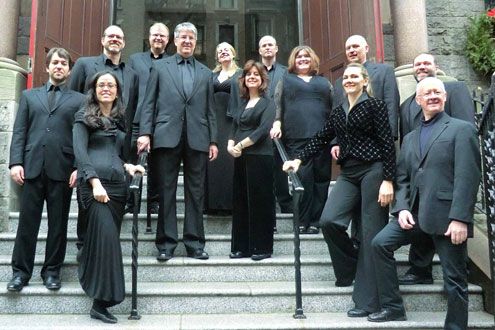Pomerium displays richly blended artistry at Music Before 1800
Mary Tudor reigned as Queen of England for a mere five years, but they were certainly eventful. Mary infamously, and often brutally, suppressed the Protestants and restored Catholicism to her country for her brief rule. It was a tumultuous time, but despite being nicknamed “Bloody Mary,” it appears that her legacy is not entirely negative.
Alexander Blachly, director and founder of the vocal ensemble Pomerium, would probably argue that her most important legacy is that of her music. Part of her restoration of Catholicism included Latin texts, and, more importantly, Gregorian chant of the Mass and Office. Mary encouraged her composers to develop chant-based polyphony and eschew the “simplicity” in Protestant ideals in favor of the intellectually demanding and abstract. Because of these convictions, she managed to cultivate an amazingly rich body of music, which came neatly into focus for Pomerium’s concert Sunday afternoon as part of the Music Before 1800 series at Corpus Christi Church.
Pomerium, founded in 1972, has established itself as a leading performer of Renaissance a cappella music. Their tight sense of ensemble and translucent blending was magnificent Sunday afternoon.
Seemingly from thin air, the concert opened with a unison chant in the low male singers from which it was impossible to pick out individual voices; it was downright gorgeous. Singing complex polyphony is impressive enough, but singing a single line of chant with multiple voices that sound as one is even more so. It was in these exposed moments, when the singers self-lead without a conductor, that the group’s musicianship and ability became manifest.
The program centered on Thomas Tallis’ Missa Puer natus est, of which only the Gloria, Sanctus, and Agnus Dei have survived to the present day. Interspersed before and between the movements were motets by Christopher Tye, Robin White, William Byrd, and John Sheppard – all written (or strongly presumed to have been written) during Queen Mary’s reign.
Pomerium is technically of the highest caliber, but most impressive was how perfectly they tune with each other. Even when converging from opposite directions to a unison note, they locked in right away every time, which had the exquisite effect of beaming their sound throughout the acoustically superb Corpus Christi Church.
If one could have hoped for anything more, it might have been a little more dynamic variance. During a few of the sections of thicker polyphony, there were glimpses of a fullness of sound that was utterly breathtaking, but these moments were fleeting. It almost seemed as if there was a level of restraint in their singing, and a boundary of sound that couldn’t be crossed. This music was written for spaces that support the kind of singing where a simple, soft chant will carry, and where the largest of sounds permeates to the core. This would have been particularly possible in Corpus Christi Church, but Pomerium stayed rather middle of the road.
That said, it was truly refined singing, musically and technically, and with scholarship in tow, it is apparent why Pomerium has remained such an eminent group over the years.
Pomerium’s next performance will be 5 p.m. Dec. 22, 5 p.m. at All Souls Unitarian Universalist Church. pomerium.us
Fretwork will perform the next concert in the Music Before 1800 4 p.m. Nov. 10. mb1800.org



